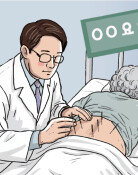Drunken People in Public Places to Be Detained
Drunken People in Public Places to Be Detained
Posted October. 26, 2004 23:06,
The police plans to introduce the tentatively named Act for the Protection of Drunken People under which the police can forcefully protect drunken to prevent crimes committed by drunken people in public places or at home.
Some say that since such an act may violate human rights, some measures must be taken in advance to minimize undesirable side effects. But they do agree on the need to enact a new law or consolidate relevant laws as there are a growing number of accidents caused by drunks.
While crimes committed by drunken people are increasing every year, the current legal system has an insufficient basis for the protection of drunken people, the National Police Agency said Tuesday. (We are) considering a plan to formulate a bill and submit the bill to the National Assembly to pass in a plenary session this year.
According to the police, while the number of crimes has slightly decreased since 2001, the percentage of the number of crimes committed while intoxicated has increased steadily from 29.4 percent in 2001 to 34.7 percent last year.
Such accidents also incur a significant waste of police manpower, with cases involving drunken people accounting for 21.4 percent, or 32,013 cases, of a total of 152,550 cases dealt with by patrol divisions across the country in the first half of this year.
The police said it is actually impossible to protect drunken people effectively under the current Rule on Operation of Stabilizing Room for Drunken People in Police Custody set in November 2000 because the rule is only an instruction and the protection of drunken people in police facilities has been criticized as illegal detention.
The Act on the Performance of Duties by police officers also stipulates the police protect drunken people only upon a request for urgent help.
The bill stipulates that the police classify drunken people as those to be protected and as those to be penalized and put them in a protection facility for a certain period according to their classification.
The police are considering a plan by which those to be protected are handed over to a regional welfare facility under local government supervision by police officers or fire workers, and those to be penalized are put into a protection facility in a police office.
However, the bill stipulates the police shall not protect drunken people over 24 hours in any circumstances. The penalty for a misdemeanor, which imposes a fine not exceeding 100,000 won, will continue to be applied.
The police are also working on a provision which stipulates the police can use tools to control resisting drunken people and that police officers are not subject to compensation for injuries in the process of friction with a drunken person, provided a police office is proved to have committed no fault.
Although civic groups and experts recognize the intention to protect drunken people, they also point out the possibility of human rights violations.
Attorney Im Young-hua of the Human Rights Committee of the Korean Bar Association asked, Is it necessary to enact a special act that can violate human rights when it is possible to protect drunken people under the current Act on the Performance of Duties by Police Officers and relevant enforcement decrees?
Director Oh Chang-ik of the Citizens Solidarity for Human Rights said, The bill violates the personal liberty guaranteed by the constitution because the police arbitrarily decide whether a person is drunk or not, and even detention is permitted in some cases.
On the contrary, attorney Park Yong-doo of the Human Rights Committee of the Korean Bar Association said, It is desirable to protect those who may commit a crime or be subject to a crime and let them return home afterwards. But the police need to avoid suppressing drunken people excessively in the process of enforcing the law so as not to harm its good intentions.
Jin-Kyun Kil needjung@donga.com leon@donga.com







